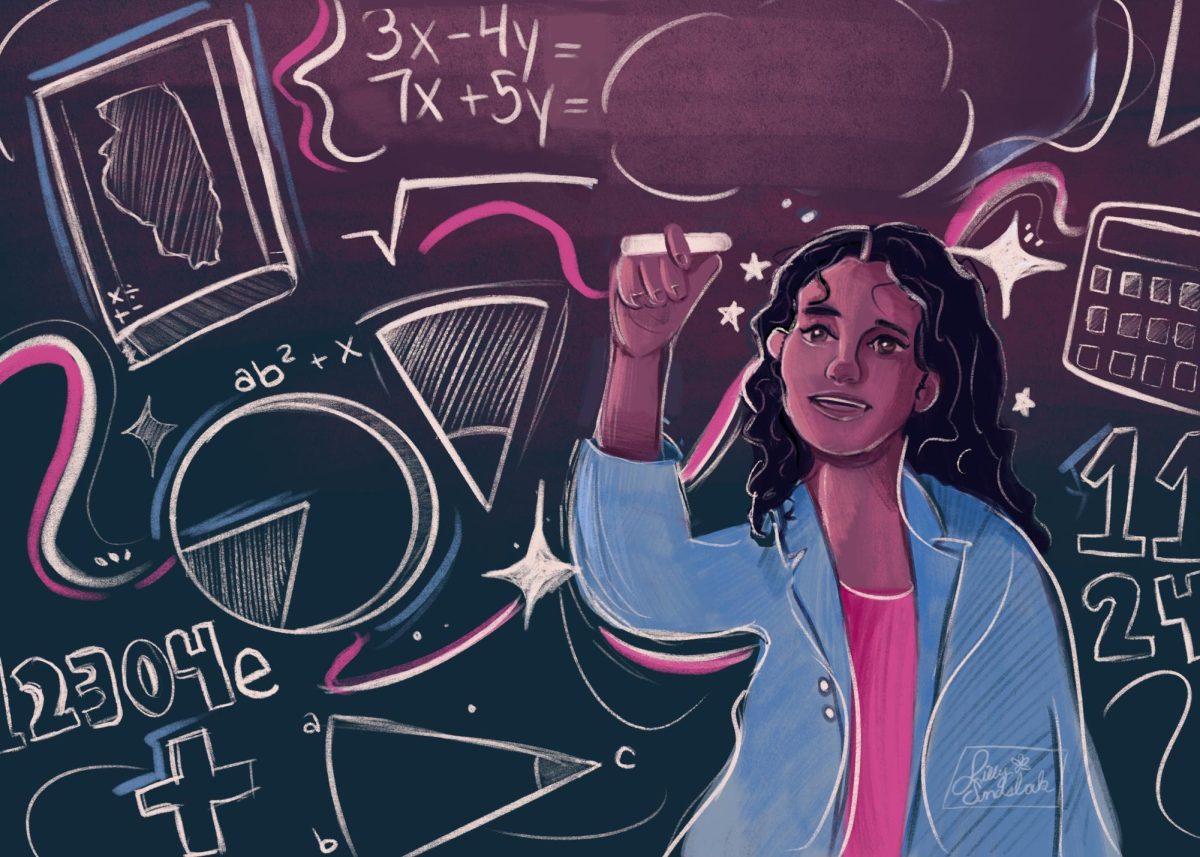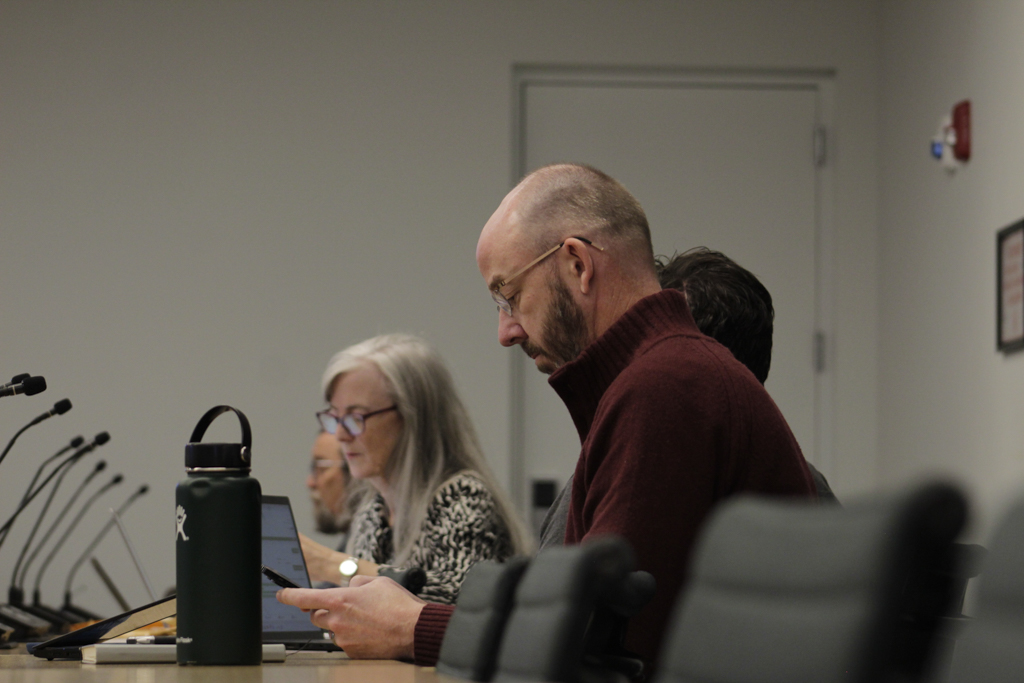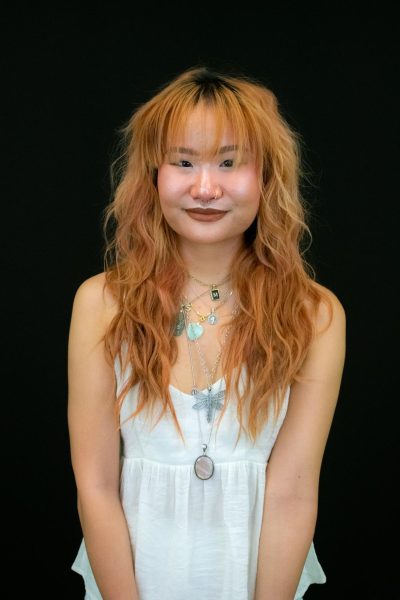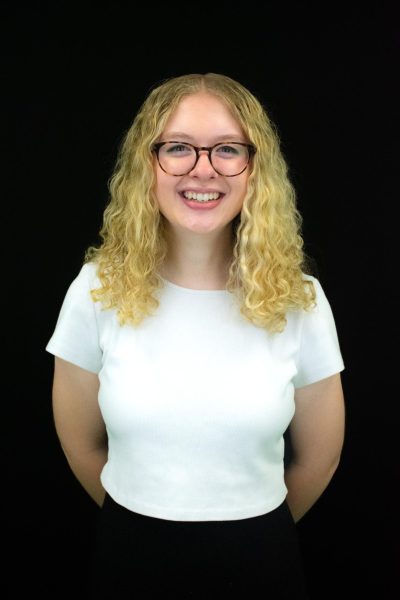Columbia math faculty, librarians and academic technology personnel are currently working on free open educational resources through LibreTexts and WeBWorK to be used in math courses by the 2026 spring semester.
This past summer, the college received a $149,996 grant administered by the Illinois State Library and the Consortium of Academic and Research Libraries in Illinois. The grant will be used to develop textbook chapters and course material published on LibreTexts and homework software through WeBWorK that will be replacing current textbooks and homework software in “Basic Math,” “College Math,” “Liberal Arts Math” and “Quantitative Reasoning.”
Elizabeth Davis-Berg, a professor in the School of Design, is the coordinator of the peer reviewers for this project and is considered to be the co-director with Arlie Sims, the head of reference and instruction at the library.
“You mash up content with other material, so you’re taking content that already exists that’s both an educational resource, and you’re reformatting it, adding new content, taking out some content, changing the order– those kinds of things to make it fit their current purpose,” he said.
Sims said that this will be the second grant for an OER that the library has received. The previous OER grant the library received was for the “Authoring Culture: The Foundations of Twenty-first Century Writing” text used in first-year writing courses, as the Chronicle previously reported.
Davis-Berg said professors always run into situations where students can’t afford to purchase the class materials but need the class to graduate.
“And there’s nothing I can do,” she said. “If you don’t own the textbook, you can’t do the homework. You can’t take the tests.”
Davis-Berg said she wishes that there was something she could do to help the students, and that’s part of the reason they applied for the grant.
Davis-Berg said students are expected to have money set aside in their tuition to pay for books, but how that works theoretically versus in actuality in the student budget “are a really different thing.”
“We have so many people that can’t buy books for everything, and Columbia doesn’t have the internal money to help anyone who can’t afford software,” Davis-Berg said.
On the school’s bookstore website, course materials for the four math classes range from $50 to over $130.
Davis-Berg said that they will be saving students “more than $100,000 in textbooks in one year” with the materials the team is putting together.
She is currently already using an Open Stacks, an OER, for some of the topics in her ecology class. While she said the resource is not very good, she couldn’t justify having students spend the original $89 when they could be spending $50 instead.
She plans that the OER for the math courses will be a suitable supplement for the courses’ original texts.
“I need students to read a book more than I necessarily care if it’s the best book,” Davis-Berg said. “If everybody comes in having read something, even if it wasn’t really exactly what I wanted them to be reading, we’re still in a better place than if half the students didn’t buy the book.”
Davis-Berg said that she’s excited to see how the free OER will affect student success in math courses.
“Whether it’s average grades, whether it’s lower DFW rates, I think we’re going to see a really quick response,” she said, referring to students who receive a “D” or “F” or who withdraw from a course.
Azar Khosravani, a professor in the School of Design and contributor to the project, said that it sometimes takes a while for all students to gain access to the required materials for classes. However, by providing an OER, she thinks “it makes it easier and people will be able to participate from day one.”
Jason Sullivan, a junior theatre design and technology major, is currently taking “Liberal Arts Math” and had to pay over $100 for the course material. He said that making the resources free would be “so helpful.”
“I struggle in math, and now I need to pay $103 to do my required math course,” Sullivan said. “That really did not help with the want to come to this class, but if it were to be free, it would be more of an incentive for me to learn.”
Sims said that there’s a lot of evidence showing that replacing expensive textbooks with free OERs increases student satisfaction, engagement in courses, and “might even have an impact on retention.”
He thinks this is a wonderful project with how they will be “able to alleviate affordability for students,” as many students are first-generation students or receive financial aid, and “don’t have money to burn.”
Mackera Molomangai, a senior marketing major, had previously taken “Quantitative Reasoning” for her math credit. Molomangai said that by not having required course materials included in the tuition, it feels like the school isn’t taking into consideration students who may be struggling financially.
“I feel like if we are to use those softwares for class, it should be included in our tuition to begin with,” Molomangai said. “And they give you about two weeks or a week and a half [to buy the resources], but even in two weeks, you’re going to fall behind.”
While the library carries course-required textbooks on reserve for books over $40, Sims said that the library does not have access to the online homework software. The codes for the software that corresponds with the textbooks have to be purchased by the individual student.
Sims also said that one of the team’s objectives is to make the work problems and examples “more reflective of our student body,” keeping in mind students’ interests and the diversity within the college. He gave the example of using different names and gender identities that align more with the student population.
Khosravani said that she thinks it’s nice that they’re trying to diversify the resources, and she’s glad the school is very conscious of inclusivity.
“I have noticed in many textbooks that the statement of the problems does not consider diversity the way we see diversity, and it could, at times, be ignoring things,” Khosravani said.
Lawrence Schindler, a senior music business major, took “Liberal Arts Math” his first year. He said that he thinks it’s great to be diversifying the characters in work problems.
“I think that’s following what Columbia is all about in the first place,” Schindler said. “I think that the beauty of Columbia is that it’s so diverse.”
To further inclusion, the grant also includes money for a Spanish translation of the open educational resource and the “Authoring Culture” open educational resource, according to Davis-Berg.
“Authoring Culture: The Foundations of Twenty-first Century Writing” is a free online textbook that replaced the “Key Concepts in Writing and Rhetoric” textbook for first-year writing courses. The text was put together by Columbia faculty and published on LibreTexts during the summer on Aug. 15.
Daniel Jordan, an associate professor in the School of Design and another contributor on the project, said he hopes that the Spanish translation of the materials will help Spanish-speaking students in their learning, as well as acknowledge their presence and importance at the college.
“That hopefully will make those students feel more welcome in coming and asking for help in office hours and things like that,” Jordan said.
Anissa Aguilar, a sophomore illustration major, took “Quantitative Reasoning” their first year. They said they think the Spanish translation could make it easier for Spanish-speaking students to ask for help from others who also speak the language.
Davis-Berg said that there are currently five full-time math faculty members who are going to be writing pilot chapters, or at least the homework problems, in the spring and summer that they will be piloting some of by next fall.
However, the first step is to get the WeBWorK homework server up to see how it functions and how difficult it may be to develop problems.
Davis-Berg said that with some of the money from the grant, part-time faculty could be brought on to the project later on to review the chapters and homework, and possibly also contribute.
Students could also take part in developing this open educational resource in the later processing stages by reading over the homework and reviewing for DEI, but Davis-Berg said she wants to make sure that everyone could be compensated for their time using the money from the grant.
Overall, Sims said that he is very proud that Columbia is taking part in creating another open educational resource.
“It is something that may change the face of education in Illinois,” Sims said.
Copy edited by Vanessa Orozco
Resumen en Español
La Biblioteca Estatal de Illinois y del Consorcio de Bibliotecas Académicas de Investigación de Illinois dio una subvención de $149,996 a Columbia para crear recursos gratis de matemáticas. Los recursos de LibreTexts y de WeBWorK se podrá acceder al público, y reemplazará los libros de textos en el semestre de la primavera de 2026, para usar en los cursos de matemáticas de “Matemáticas Básicas,” “Matemáticas Universitarias,” “Matemáticas de Artes Liberales” y “Razonamiento Cuantitativo”. Elizabeth Davis-Berg, una profesora de la escuela de diseño, es la coordinadora de los revisores pares y co directora con Arlie Sims, el jefe de instrucción y referencia de la biblioteca de Columbia.
Resumen por Sofía Oyarzún










